General
Mak induction workshop empowers staff to execute their duties
Published
9 months agoon
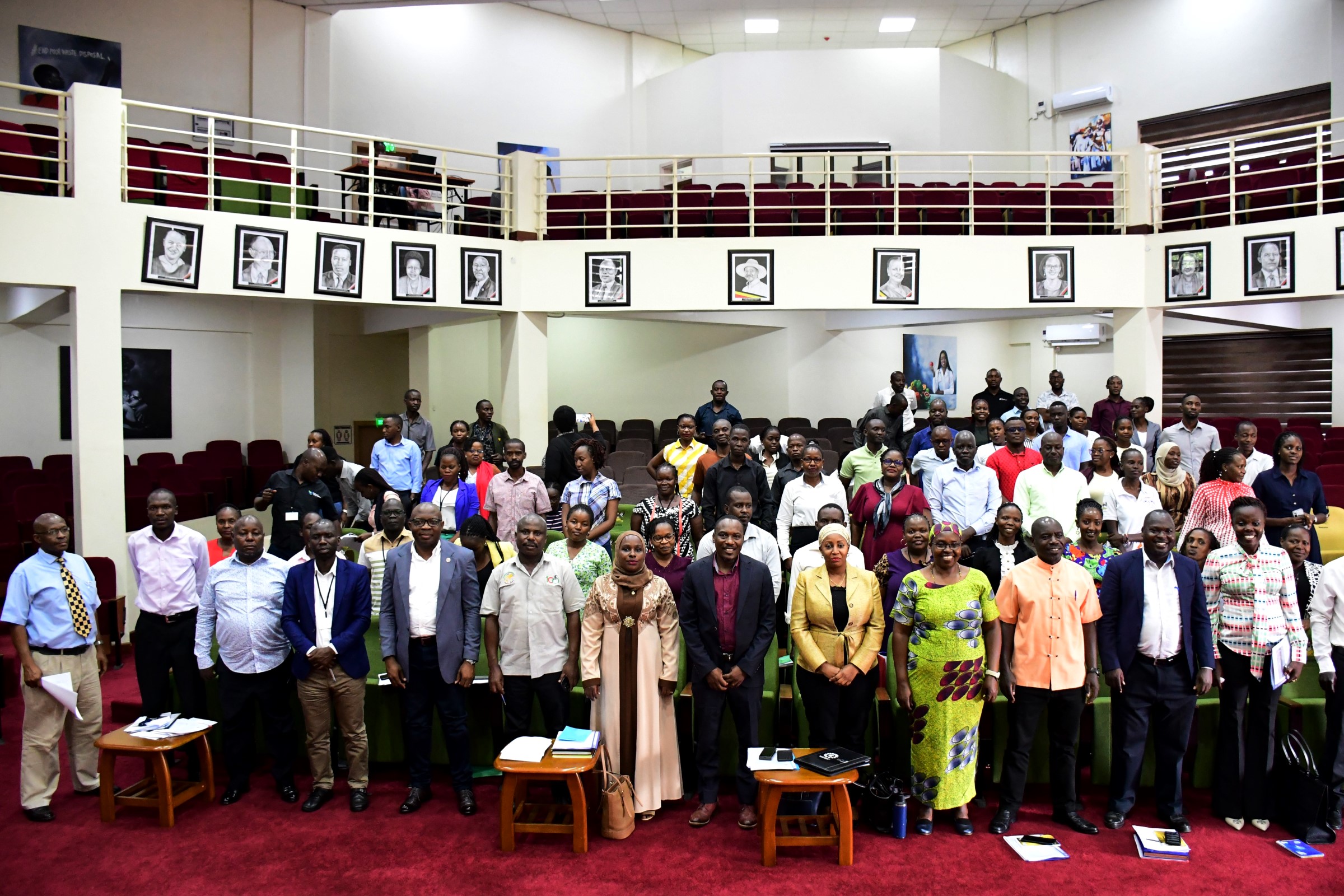
16th May 2025 started on a high note as over 100 newly appointed staff at Makerere University convened to participate in the second day of the Induction workshop organized by the Directorate of Human Resources.
The Chief Human Resources Officer, Mr. Deus Tayari Mujuni highlighted that Makerere University presents staff with enormous opportunities for career and professional growth, research, partnerships, and valuable networks in the respective fields.
Re-affirming the statement from the Chief Human Resources Officer, the Acting Deputy Vice Chancellor (Finance and Administration), Prof. Winston Tumps Ireeta who joined the University service in 2001 testified that the institution has presented him with opportunities for growth in the academia, research and leadership. He served as the Head of the Department of Physics for nine years, where he rose through the ranks from Lecturer, Senior Lecturer, to Associate Professor. Additionally, he has served as a Member of Council, and the University Senate. Currently, he is the substantive Principal of the College of Natural Sciences.
Prof. Ireeta congratulated the new staff upon joining Makerere University, which he described as a merit-based institution. “I can confirm that the recruitment process is based on merit. It is highly competitive and every step is followed to recruit the best candidate,” he said.
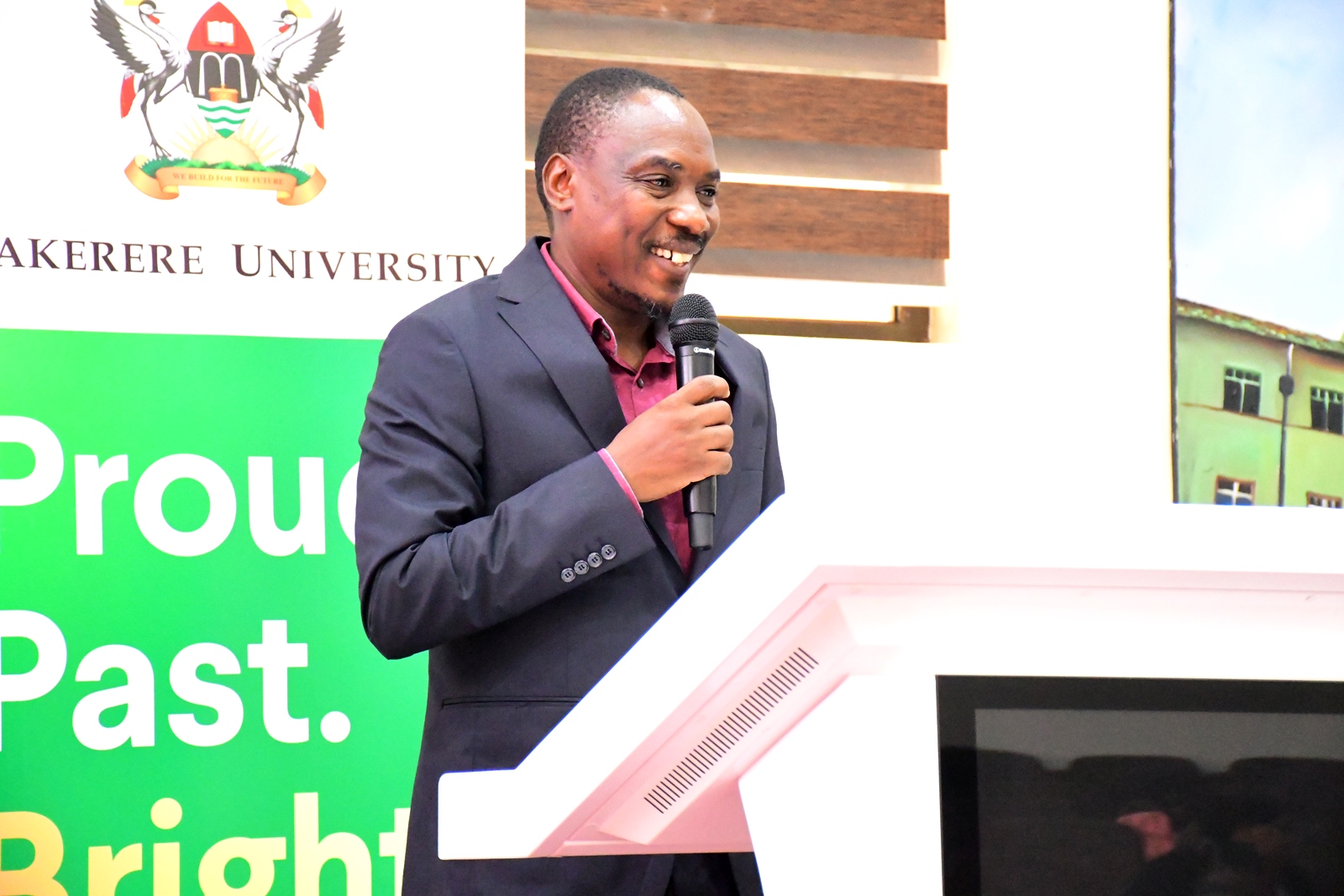
The second day of the Induction workshop featured the following topics: Legal instruments, the collegiate system, human resources management, the electronic human resource management system (ehrms), understanding the human resource functions, policies on gender equality, the policy and regulations against sexual harassment, academic policies, the Safeguarding policy, the procurement function, the audit function, and library resources.
The induction workshop presented the newly appointed staff with a golden opportunity to understand the evolution of Makerere University from a faculty-based to a collegiate system. Established in 1922 as a humble technical school with 14 male students, Makerere has evolved into one of the leading universities in the world. It boasts of a student population of over 35,000 and hundreds of thousands of alumni spread across the globe.
Chairing the session on the collegiate system, Dr. Ronald Bisaso, the Deputy Principal of the College of Education and External Studies (CEES), described Makerere University as an intelligent organization that presents staff with career growth and excellence in life. Dr. Bisaso joined the university service in 2008 with a substantive appointment as Assistant Lecturer, and has risen through the academic ranks up to Associate Professor. He has also served as an academic leader; formerly as Dean and currently Deputy Principal. Reflecting on his impactful journey since 2008, he referred to Makerere University as the land of possibilities. As the new staff begin tapping into this rewarding resource, he advised them to maximally utilize their potential to contribute to the growth of Makerere University.
Dr. Bisaso informed the participants that Prof. Ireeta who witnessed the transition from the faculty- based system, was the best university leader, member of staff and alumnus of Makerere University to present the operations and functions of the collegiate system.
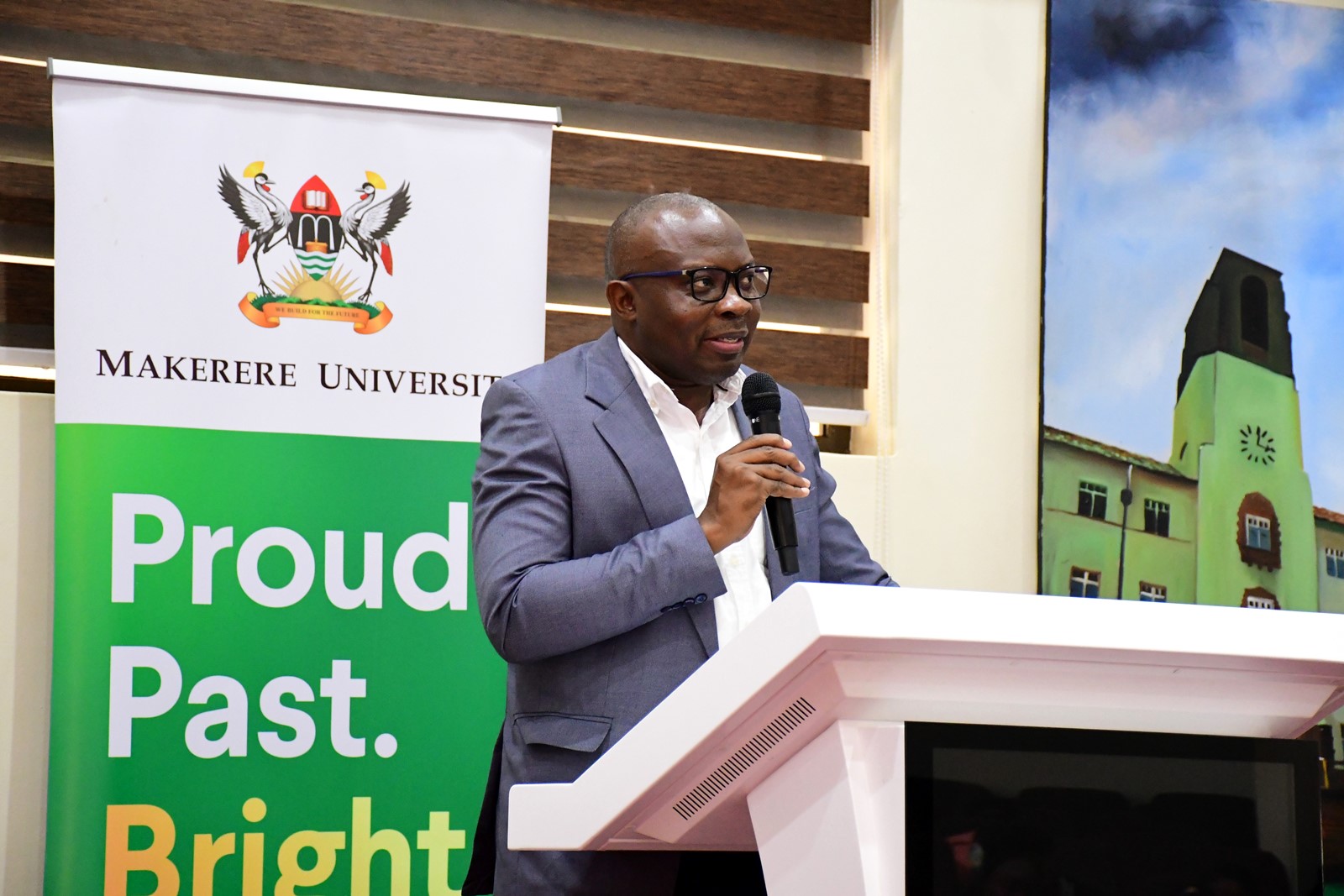
Presenting the collegiate system to the newly appointed staff, Prof. Ireeta highlighted that the collegiate system kicked off in 2011. The strategic decision was informed by the continuous growth of Makerere University and the need to enhance service delivery to students, staff, alumni and society.
Prof. Ireeta pointed out that the university has nine (9) colleges, two (2) stand-alone schools and two (2) institutes. The Colleges include: Agricultural and Environmental Sciences; Business and Management Sciences; Computing and Information Sciences; Education and External Studies; Engineering, Design, Art and Technology; Health Sciences; Humanities and Social Sciences; Natural Sciences; and Veterinary Medicine, Animal Resources and Biosecurity. The stand-alone schools include: School of Law, and the School of Public Health. He also mentioned the two (2) institutes namely: Makerere University Institute of Social Research (MISR) and the Institute of Gender and Development Studies (IGDS). Prof. Ireeta advised the new staff to visit the Makerere University website (https://mak.ac.ug) to acquaint themselves with in-depth information about the institution, the respective colleges and units.
Focusing on the operations of the collegiate system, he outlined the reporting hierarchy that ensures a smooth and harmonious relationship among the colleges and the central administration. He explained that the College Principals report to the Vice Chancellor. In addition, College work plans, budgets, procurement plans and among others, are presented and approved by the mandated offices at the Centre.
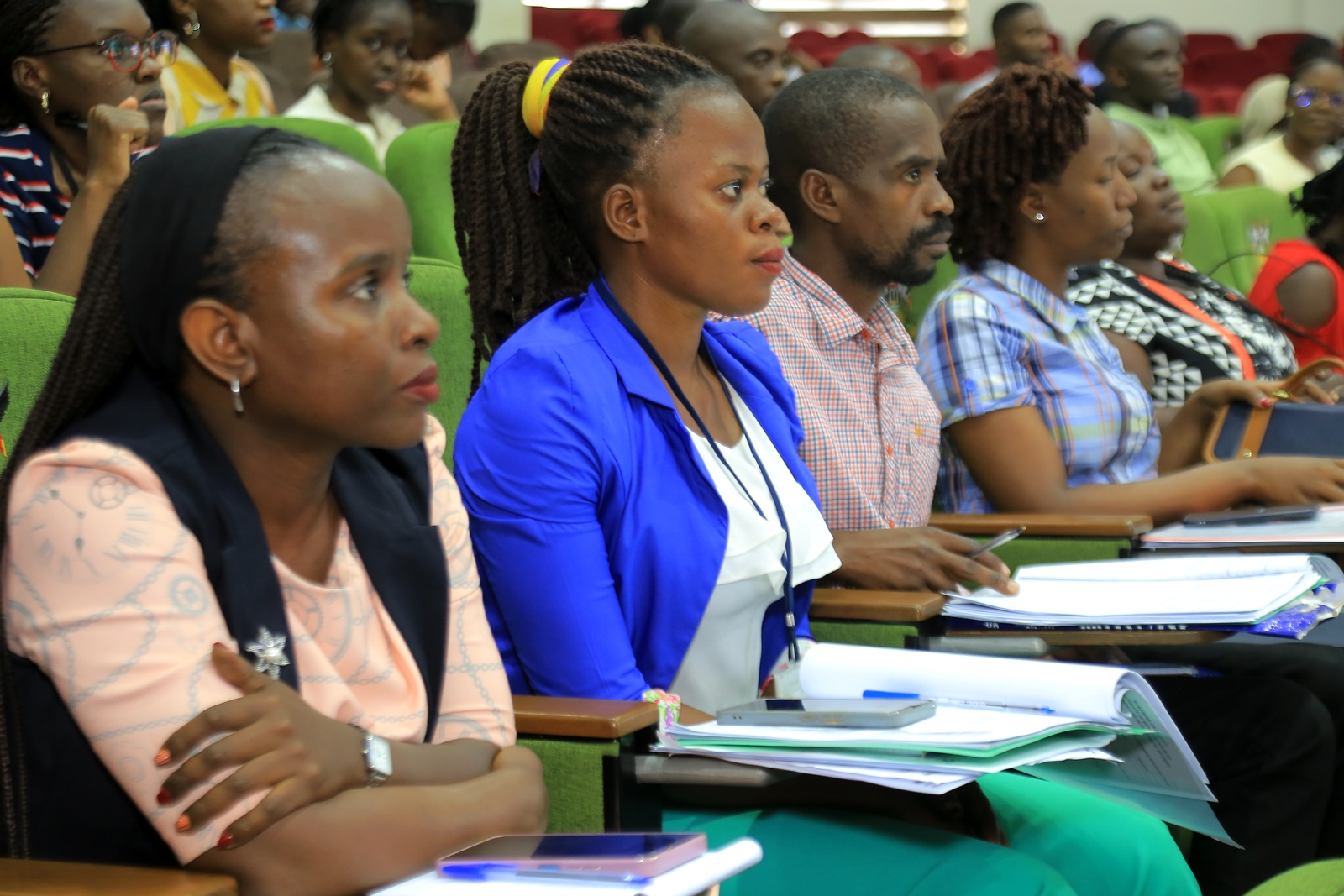
Prof. Ireeta urged the new staff to respect the reporting hierarchy with special reference to the Immediate Supervisor mentioned in the appointment letter. He encouraged the newly appointed staff to utilize the following offices at the Colleges: Office of the Principal, School Deans, Heads of Departments, College Bursar, College Registrar, College Communication Office, College Procurement Office, College Librarian, and among others.
Responding to a participant who expressed the desire to join a SACCO, Prof. Ireeta who acknowledged being a member of one of the SACCOS in the University, advised the members of staff to study the different SACCOS within the administrative units, and, at the respective colleges and make informed decisions. “With time, you will learn about the different SACCOS within the University. It is important that you listen to what each SACCO has to offer including the laws available to safeguard your savings. After thorough scrutiny, you will make a personal decision on whether to join a particular SACCO,” he said.
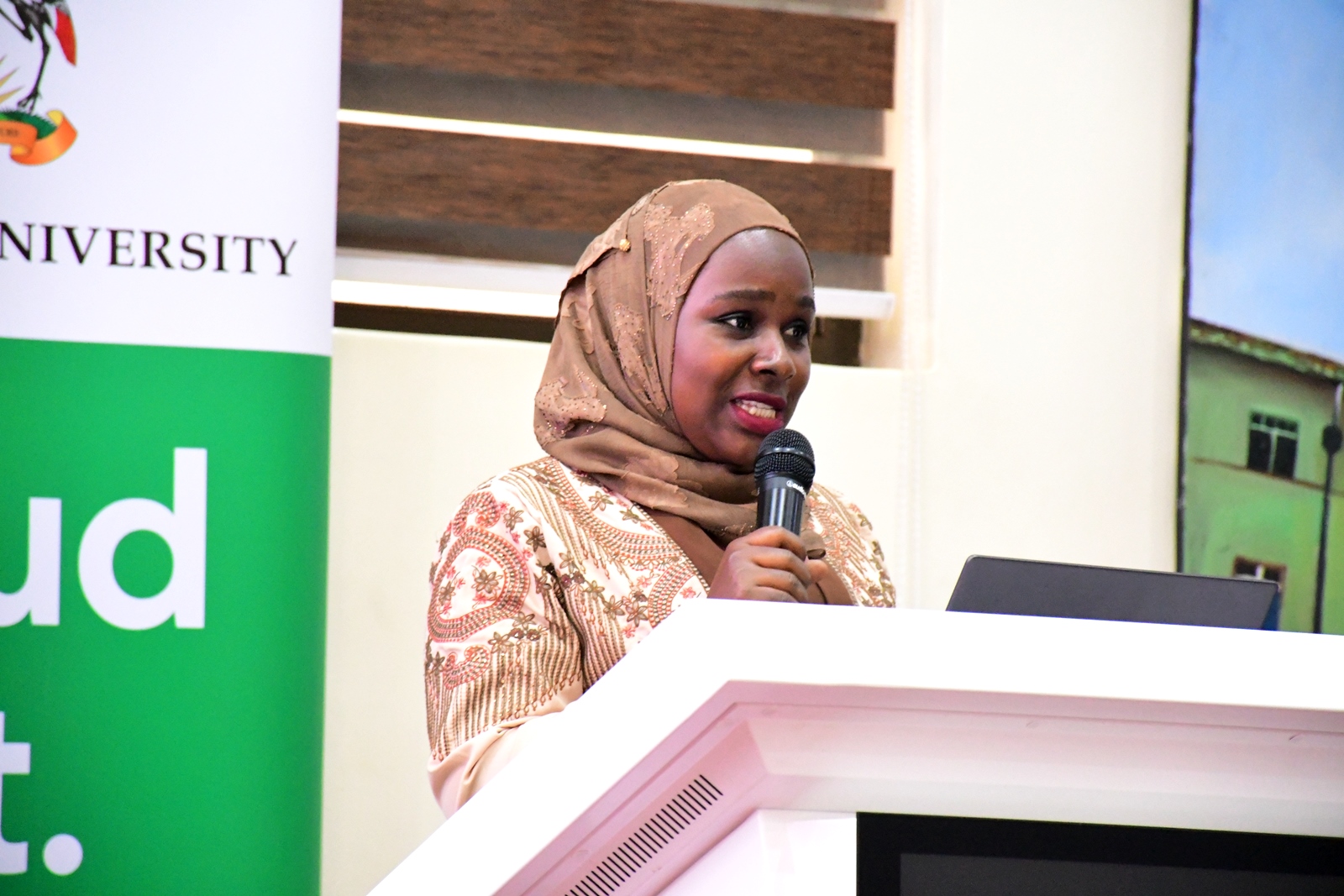
Tackling the legal instruments, the session Chair, Dr. Zahara Nampewo, who is the Deputy Principal of the School of Law, and the Presenter, Ms. Sumaiyah Nanyondo, the Chief Legal Officer discussed the relevant provisions of the laws and policies governing the University. These included: The Universities and Other Tertiary Institutions Act, Employment Act, Human Resources Manual (as amended 2009), and the Uganda Public Service Standing Orders. In addition, Ms. Nanyondo referred staff to the Makerere University policies website (https://policies.mak.ac.ug) to access and read the specific policies in detail.
The Chair for the academic policies session, Dr. Muhammad Kiggundu-Musoke, who is the Head, Department of Humanities and Language Education at CEES informed the participants that he joined the University service in 1999. Dr. Kiggundu-Musoke who shared his focus on becoming a Professor, mentioned that Makerere University had enabled him to serve as the PRO of Makerere University Academic Staff Association (MUASA), the Chairperson of MUASA, Acting Manager, Communication and International Relations at Makerere University. Currently, serving as Head of Department, he looks forward to more leadership opportunities. Dr. Kiggundu-Musoke implored new staff to understand their roles and serve diligently, emphasizing that leadership demands vision, integrity and alignment with the core functions of teaching and learning, research and community engagements.
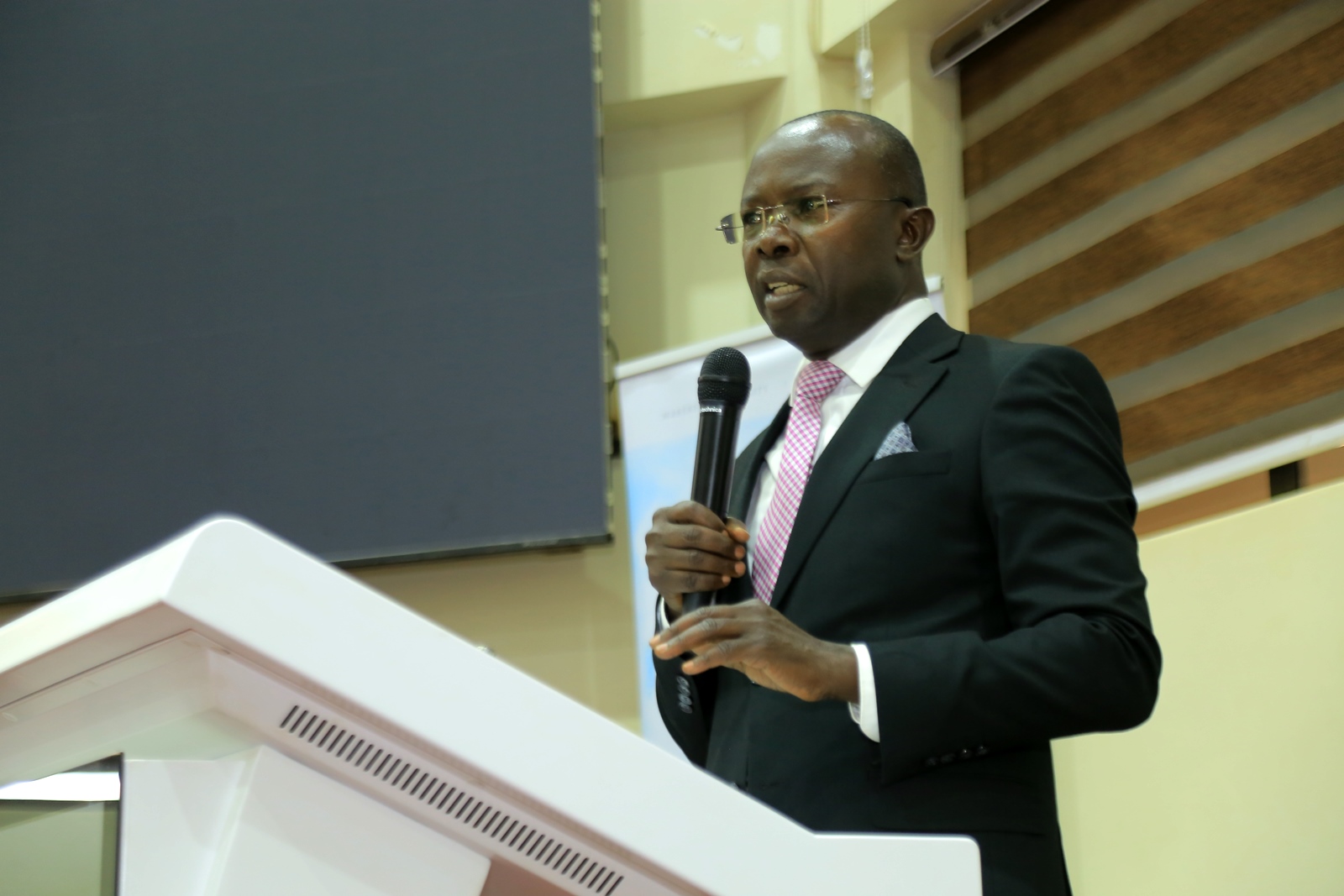
On the first day of the Induction Workshop (15th May 2025), the Secretary to Council, Mr. Yusuf Kiranda sensitized the new staff on the role of the University Council-the supreme governing body of the university. Consequently, on day two, Mrs. Patience Rubabinda Mushengyezi, the Deputy Academic Registrar (Senate) briefed the new staff about the University Senate-the chief academic organ of the university. She stated that the University Senate plays a pivotal role in the formulation of academic policies. She explained that the Department of the Academic Registrar performs functions of great value to the university. She noted that academic policies are implemented through school committees, college academic boards and designated academic leaders. Mrs. Mushengyezi rallied staff to actively participate in the implementation of academic policies. “The academic policies guide and shape the academic journey of the students at the university. Let us do our best to implement them,” she stated.
Inspiring the new staff, Mrs. Mushengyezi revealed that she joined the university service in 1998 as a part-time Lecturer. Makerere University has presented her with room to serve in the different offices under the Department of the Academic Registrar, and, widened her spectrum to the field of research, where she has been in position to serve as a Principal Investigator on some of the research projects.
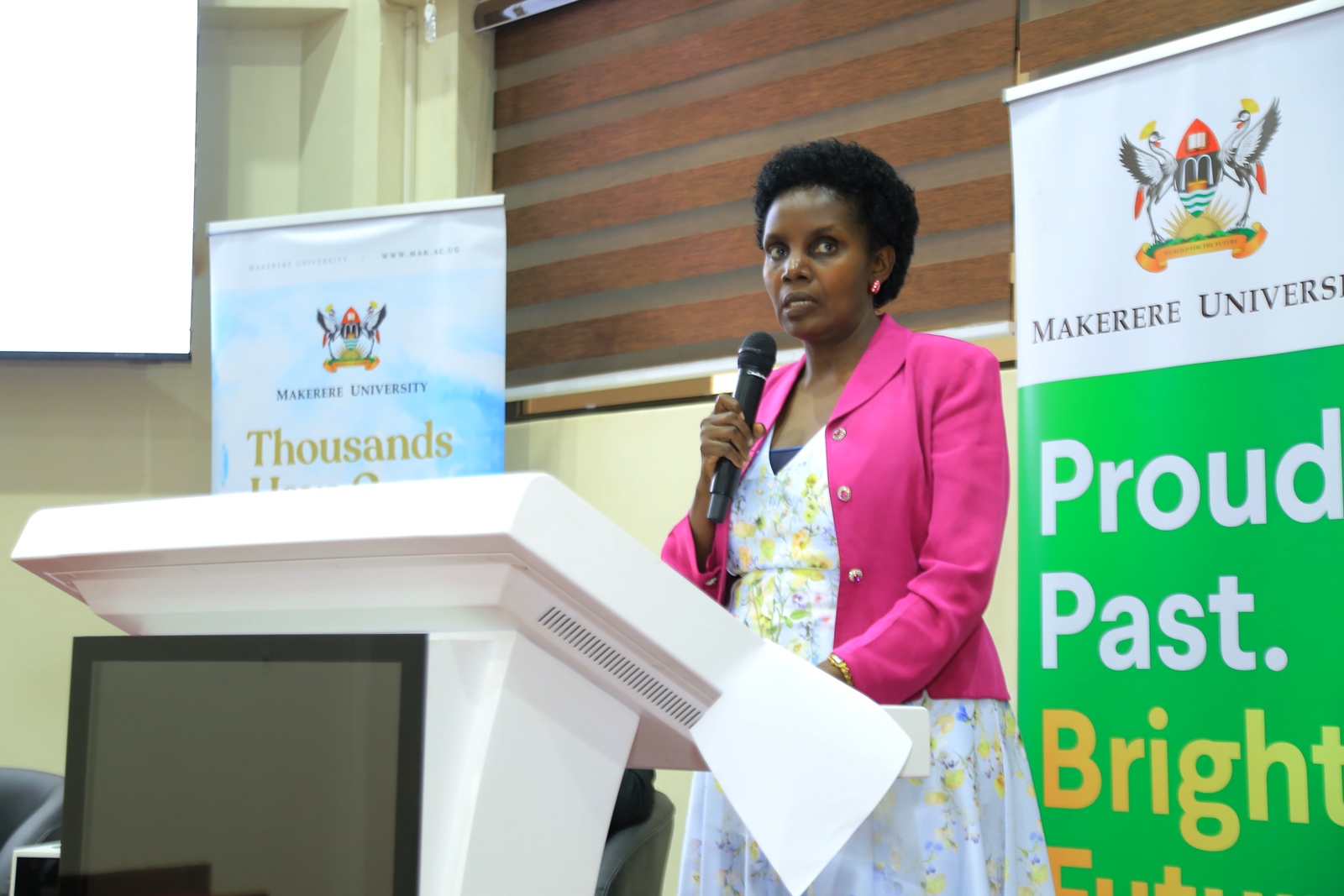
As a Principal Investigator she led a team of University staff, which contributed to a collection of organized archives of university records from 1922 to 2009. Through the Digitalization of Academic Records and Processes (DARP) project, Mrs. Mushengyezi and her research team, significantly contributed to the digitization agenda of the University.
Delivering a special message to the Administrative staff, Mrs. Mushengyezi re-echoed that her story is testimony that when you focus, you can become a researcher, grant writer and principal investigator.
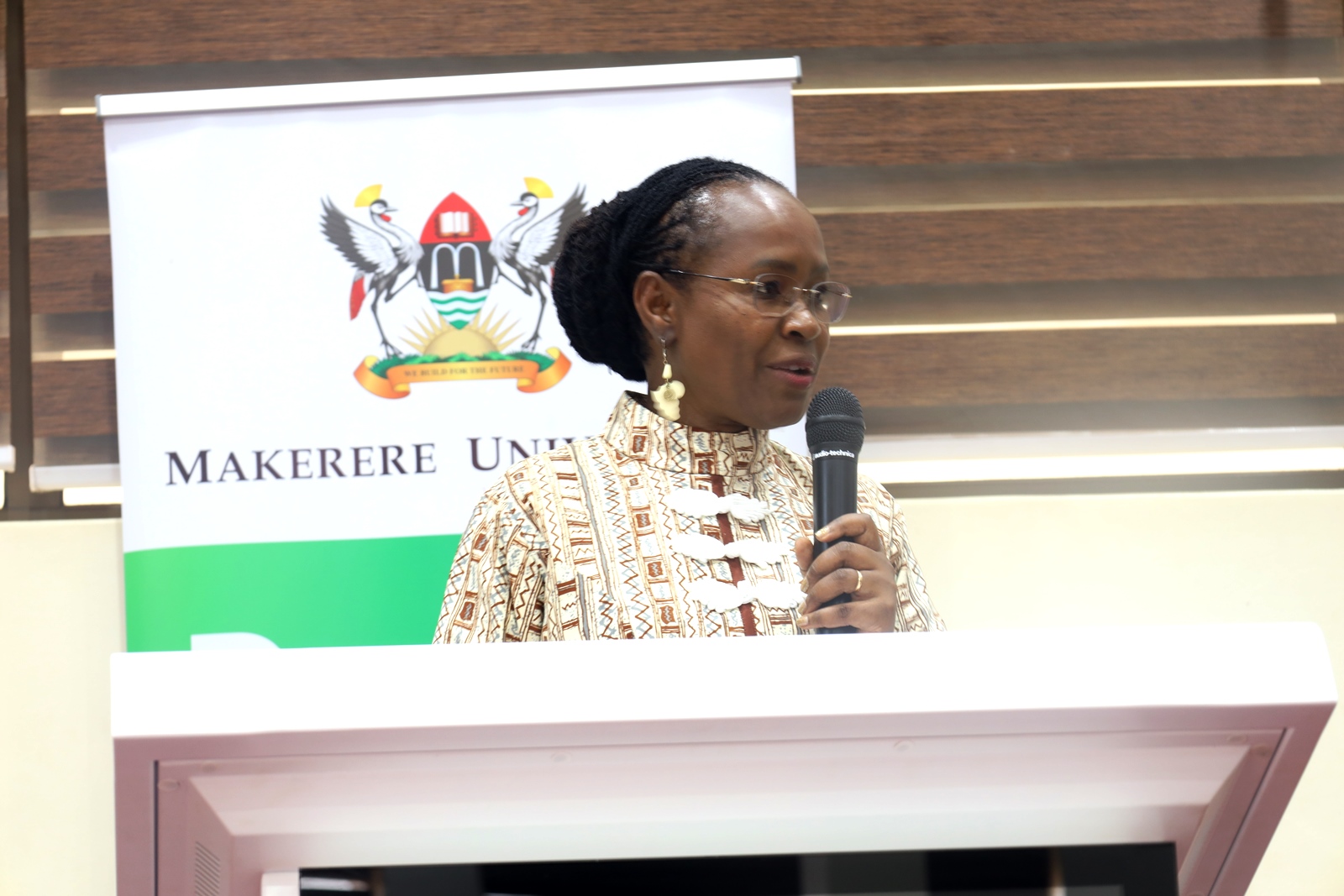
In the strategic plan, Makerere University commits to gender equality, a process which involves engendering its processes and operations. The session was chaired by Prof. Sarah Ssali, the Acting Director of the Institute of Gender and Development Studies (IGDS). Prof. Ssali who joined the university service in 2003 as a Lecturer has risen up to the rank of Professor. She has served as the Dean of the School of Women and Gender Studies, a Member of Senate and Council, and a Member of the Appointments Board. She acknowledged Makerere University for its contribution to building her profile, which has presented her with international recognition and appointments on national and internationally recognized boards. “The University has nurtured me to be a teacher, researcher and professor. I have been nominated to serve on international bodies/organs because of Makerere University,” she remarked.
At the institutional level, Makerere University established the School of Women and Gender Studies, and the Gender Mainstreaming Directorate to champion the gender equality agenda. Prof. Ssali informed the new staff that Makerere University is undertaking several programmes to conform to the international standards embodied in the gender equality seal.
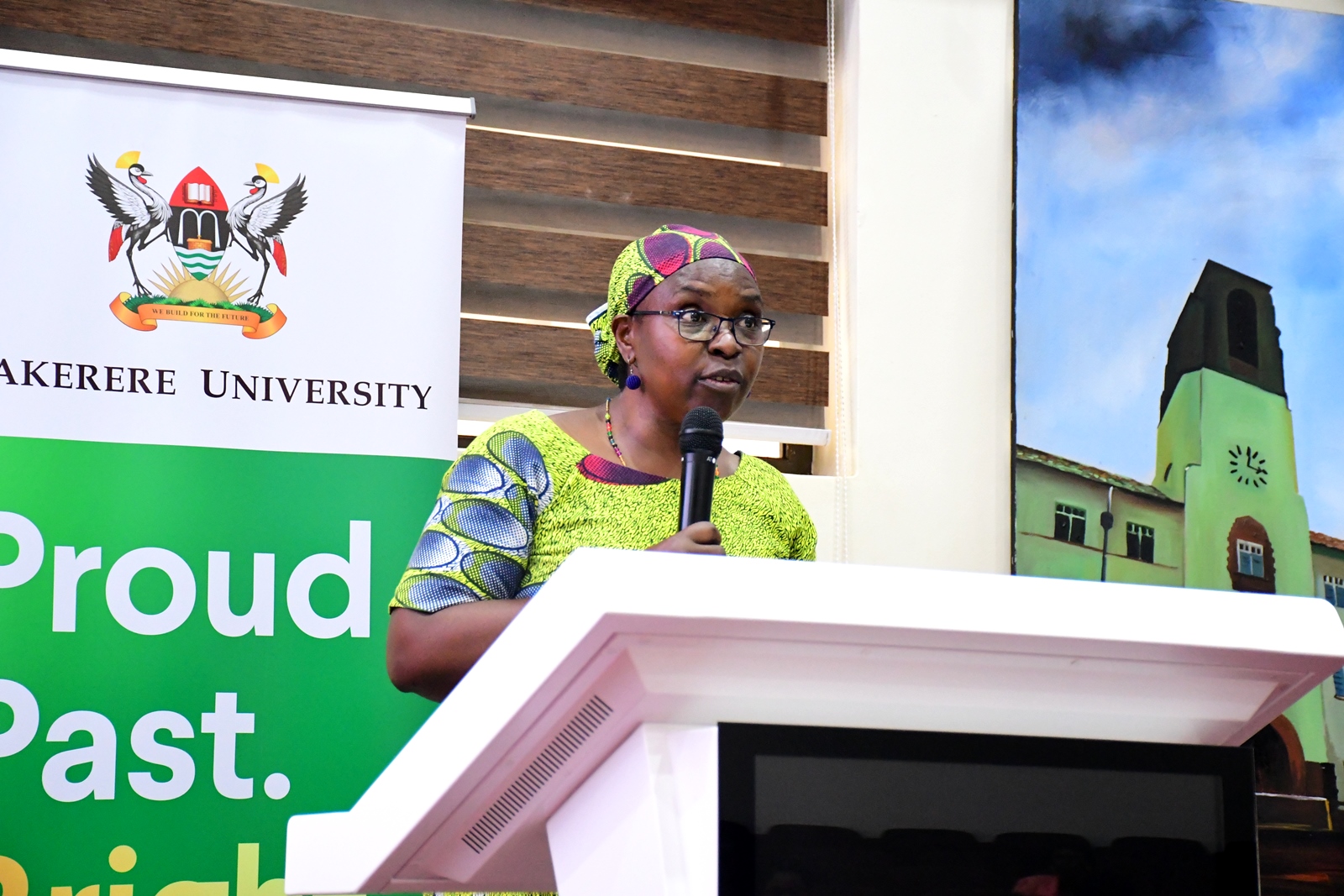
In her presentation, the Chief-Gender Mainstreaming, Dr. Euzobia Mugisha-Baine highlighted some of the historical issues that dictated the need for gender mainstreaming. She reported that Makerere started with 14 male students. This continued up 1945 when the first female students joined the institution. In addition, its founding motto was, “Let us be Men.” With time, the motto changed to the more inclusive, “We Build for the Future.” Dr. Mugisha-Baine pointed out that the Gender Mainstreaming Directorate will continue to work with the University leadership, government, ministries and stakeholders to implement policies and programmes that advance gender equality.
The policy and regulations against sexual harassment featured prominently as different University leaders on 15th and 16th May 2025, underscored the aspect of zero-tolerance. The following leaders and members of staff amplified the voices against zero tolerance: The Ag. Deputy Vice Chancellor (Academic Affairs)-Prof. Buyinza Mukadasi, the University Secretary-Mr. Yusuf Kiranda, the Chief Human Resources Officer-Mr. Deus Tayari Mujuni, the Chief Legal Officer-Ms Sumaiyah Nanyondo, the Ag. Deputy Vice Chancellor (Finance and Administration), Prof. Winston Tumps Ireeta, Prof. Sarah Ssali and Dr. Euzobia Mugisha-Baine.
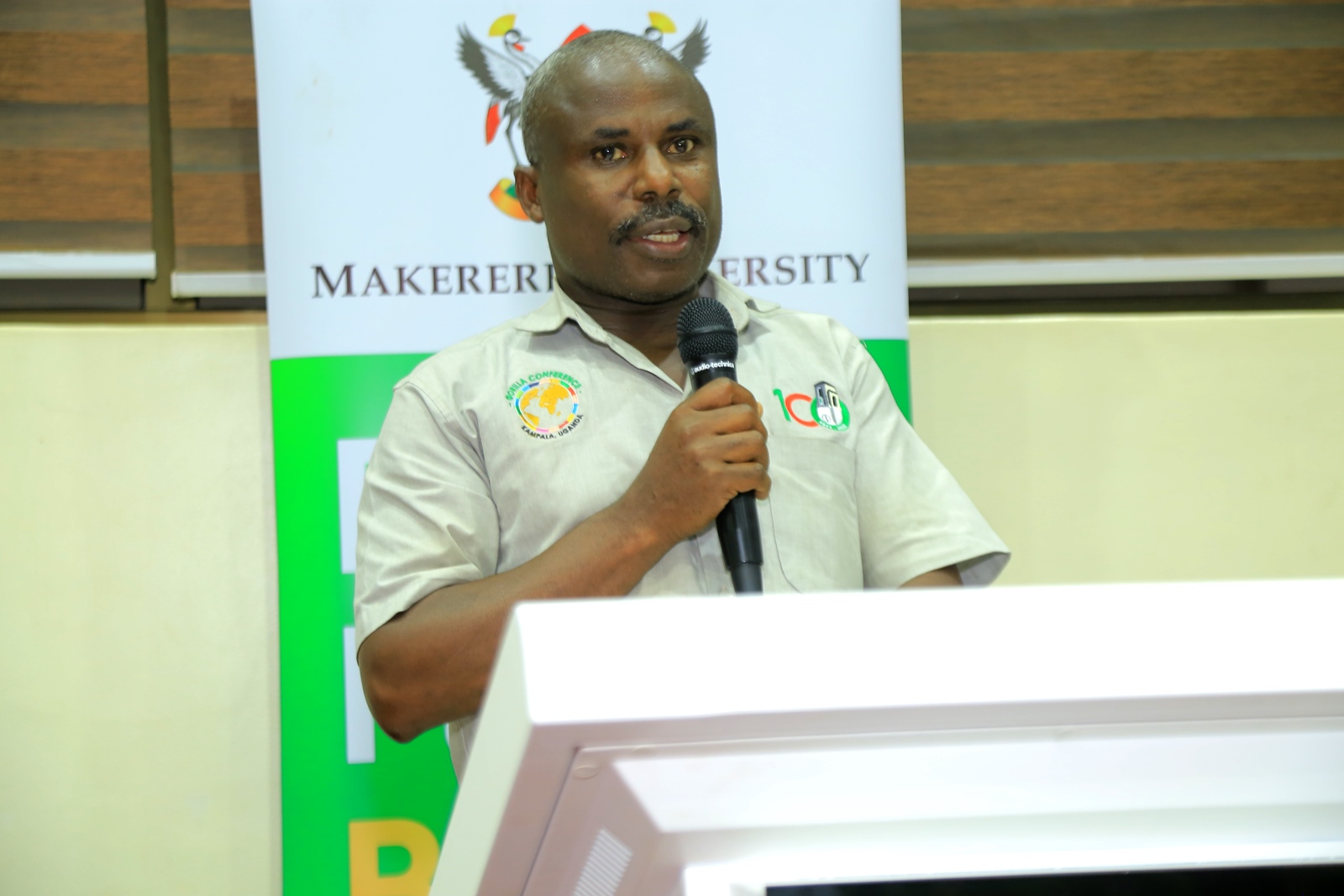
During the induction workshop, the Chief Human Resources Officer, Mr. Mujuni presented an overview of human resources management, structure and functions. He explained the human resource management function at the centre, unit levels and at the Colleges. He implored staff at the Colleges and Unit Levels to always consult the respective human resource officers.
On the aspect of digitalization, Mr. Joshua Muhumuza demonstrated the electronic Human Resource Management System (ehrms), a platform available to staff, supervisors and the Directorate of Human Resources, to execute their human resource functions, roles and expectations.
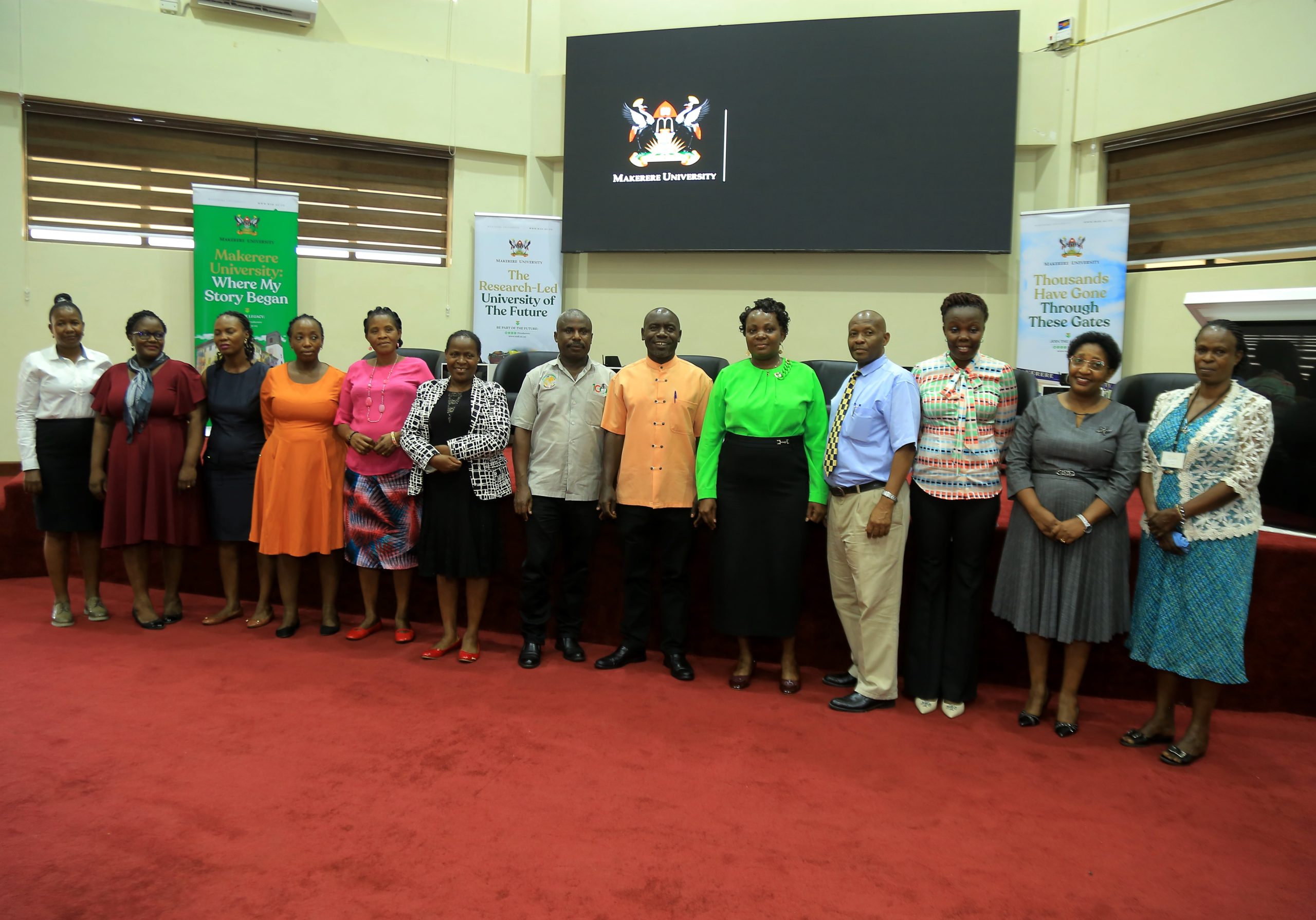
Feeding into the aforementioned presentations, the session chair, Mr. Julius Lebo called upon the four (4) line managers in the Directorate of Human Resources to brief the new staff on the specialized tasks in their dockets. Ms. Josephine Nalweyiso presented the staff development, welfare and retirement benefits. Ms. Mavis Kansiime presented the employment systems, guidelines, policies and implementation. Ms. Lawrence Sanyu tackled records and information management while Ms. Janet Nabukeera focused on performance management, the payroll and the appraisal system.
On ensuring that Makerere University continues to be a safe space for students, staff and stakeholders, the Deputy Dean of Students, Dr. Rodney Rugyema flanked by Ms Carol Kasujja, the Senior Communication Officer (Safeguarding) presented the Makerere University Safeguarding Policy. They requested staff to report safeguarding risks and incidents such as harassment, a case of unsafe situation, torture, through the MakSafeSpace-the online reporting system, https://safespace.mak.ac.ug.
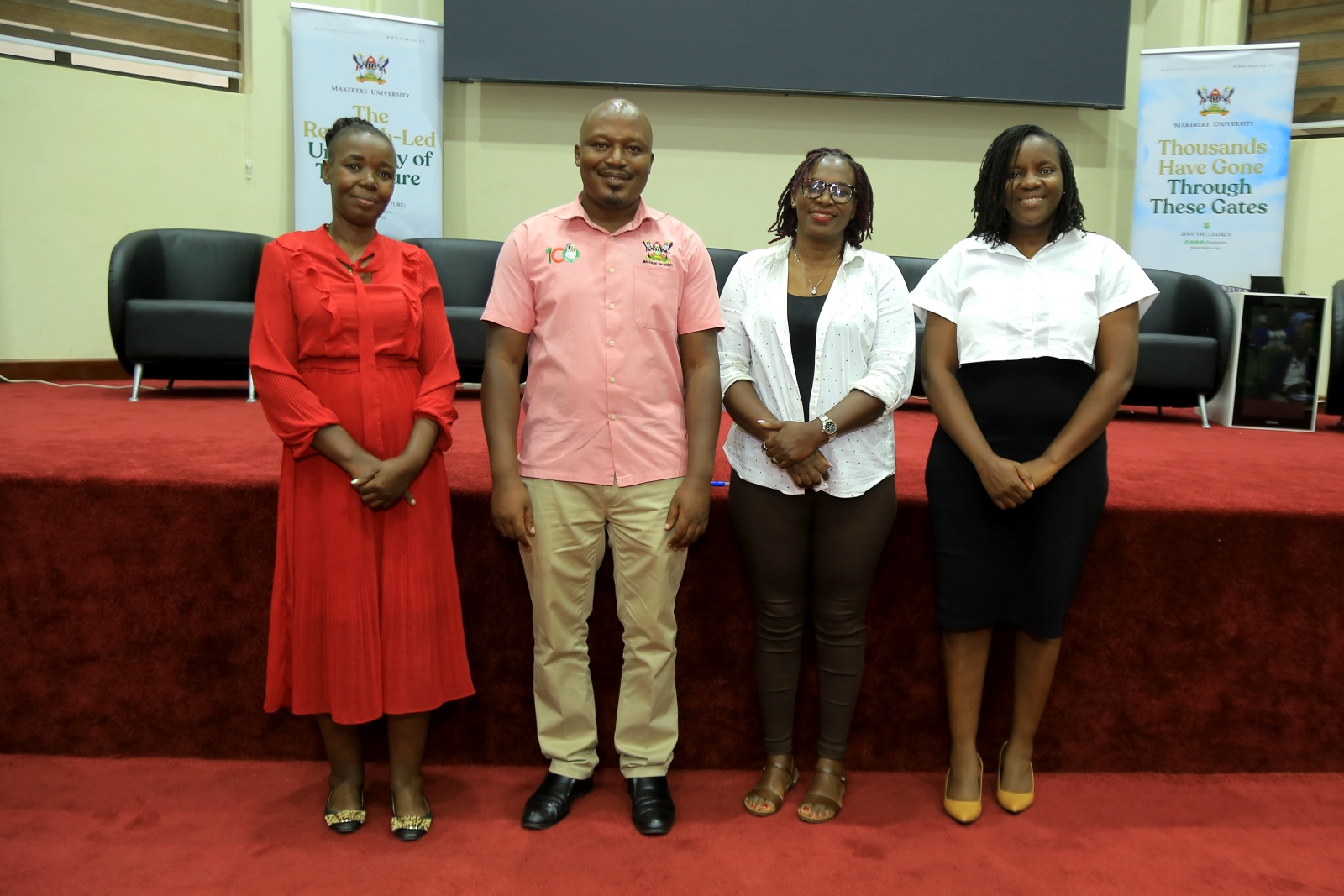
Emphasizing the collective responsibility for everyone (staff and students) to safeguarding, he appealed to the newly appointed staff to work with the Safeguarding Champions, who are members of staff in the respective Units, to report safeguarding incidents to the Offices highlighted in the policy for immediate action/response. He underscored the need to read the safeguarding policy to appreciate the language and terms when handling such cases/incidents. For instance a member of staff or student who has overcome a safeguarding challenge is referred to as a survivor, and not a victim. He tasked the newly appointed staff to access and read the safeguarding policy, https://policies.mak.ac.ug/policy/safegaurding-policy.
The Principal Legal Officer, Ms. Naome Kiconco Ochieng chaired the sessions on procurement and audit functions of the University. The Deputy Chief, Procurement and Disposal Unit, Mr. Paul Agaba informed the new staff that the procurement process should be planned and participatory, with each Unit within the University expected to have a procurement plan for each financial year. He appealed to the Colleges and Administrative Units to follow the procurement plans and submit the requisitions early to avoid delays. He also emphasized the need to involve the Unit procurement offices and accountants so that all the required documents are received and attached on the procurement requests.
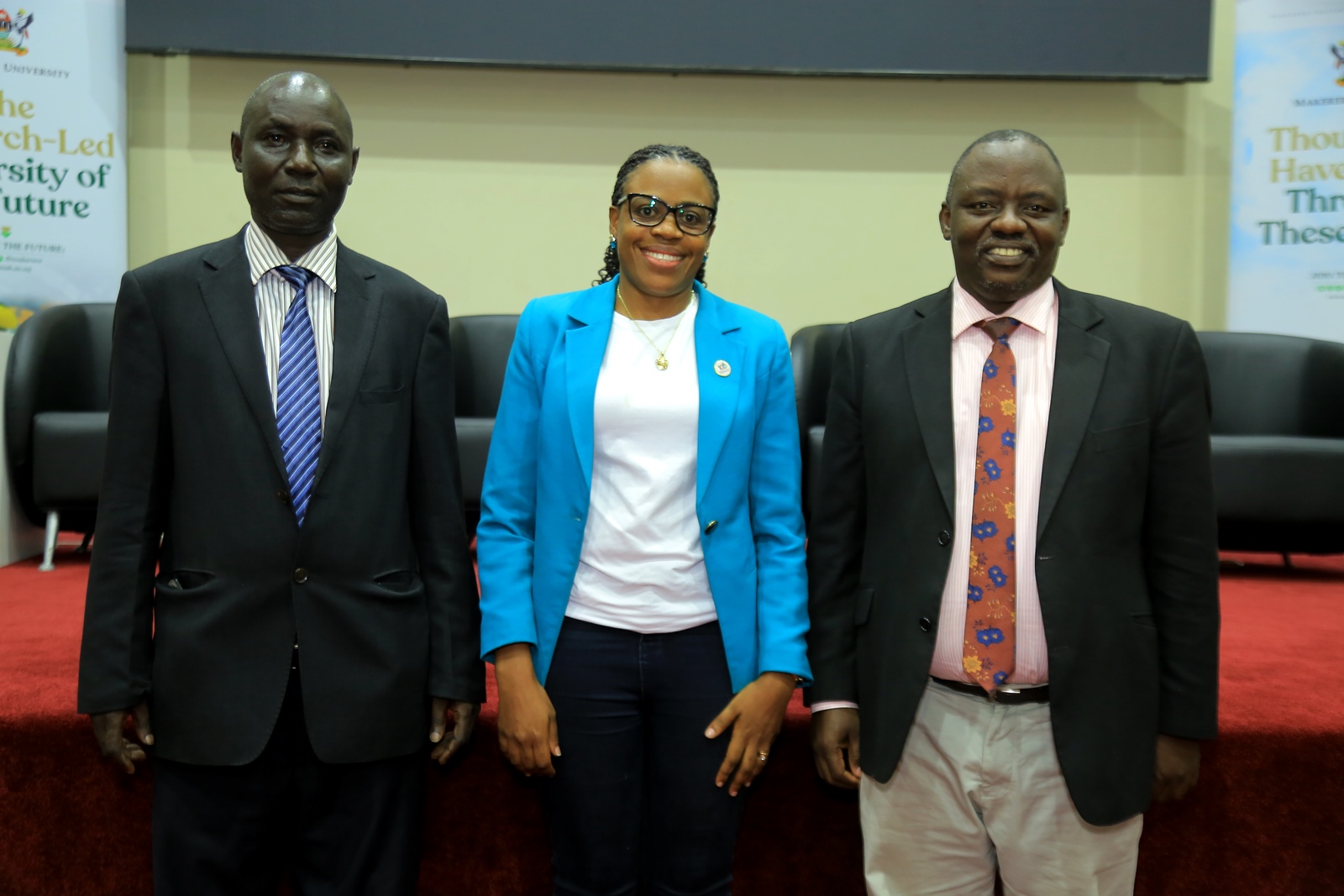
The Chief Internal Auditor, Mr. Patrick Akonyet explained that the audit function focuses on the proper utilization of university funds and resources. He stated the need to account for funds, and resources as well as executing tasks and duties within the set timelines. Presenting the audit areas of focus, he outlined the need for compliance with the Law, Memoranda of Understanding, policies and procedures, and best practices. In the area of performance, he indicated interest in directional achievement of objectives, ethical issues, budget performance, award process and project closure. He sensitized the new staff about their role in the audit process. He requested staff to provide all audit information on time, provide explanation to audit queries, provide supporting documents required for audit, and volunteer information on control weaknesses.
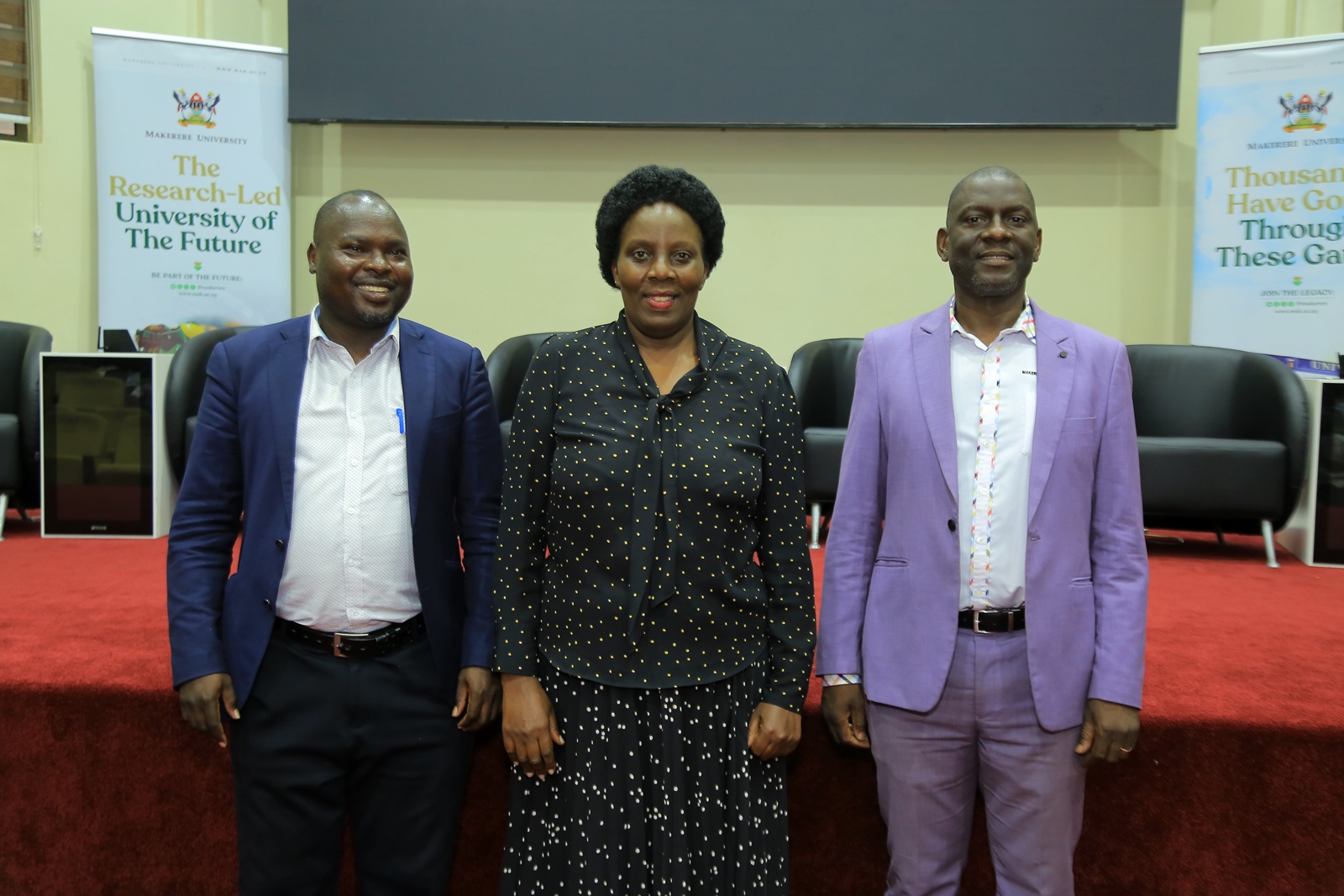
In a session chaired by Dr. Julius Kikooma, the Ag. Director of Graduate Training, the University Librarian, Dr. Ruth Nalumaga rallied staff to utilize the library services for research, reading, access to print and electronic resources. She pointed out some of the physical spaces in the Main Library designated for members of staff. She called upon staff to access the library online via https://mulib.mak.ac.ug.
The end of the presentations set the pace for the closing ceremony. The Acting Deputy Vice Chancellor (Finance and Administration), Prof. Ireeta represented by Prof. Helen Nambalirwa Nkabala reiterated that staff are the most important asset for Makerere University. The Deputy Vice Chancellor (Finance and Administration) assured staff of the University Management’s total support and cooperation in the execution of their work. He urged staff to be pragmatic and to always be part of the team that provides solutions to challenges. He commended the Chief Human Resources Officer and his team for inducting the newly appointed staff.
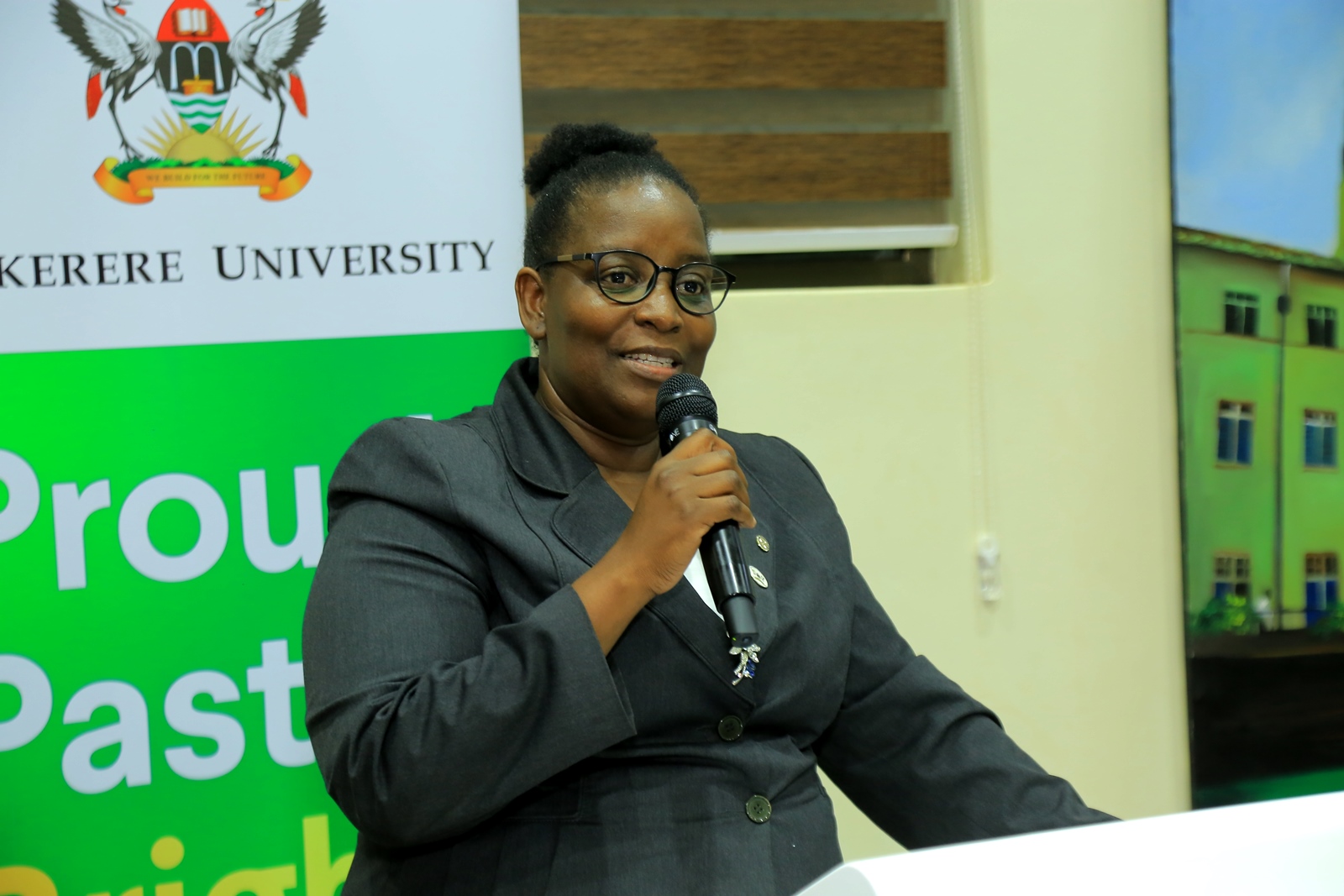
On her part, Prof. Helen Nambalirwa Nkabala, the Principal of the College of Humanities and Social Sciences (CHUSS) who has served Makerere University for 21 years said: “Makerere University has given us the best. The institution has nurtured us and availed us with numerous opportunities to shine.”
The closing ceremony climaxed with the award of certificates to staff who successfully completed the two-day induction workshop (15th and 16th May 2025).
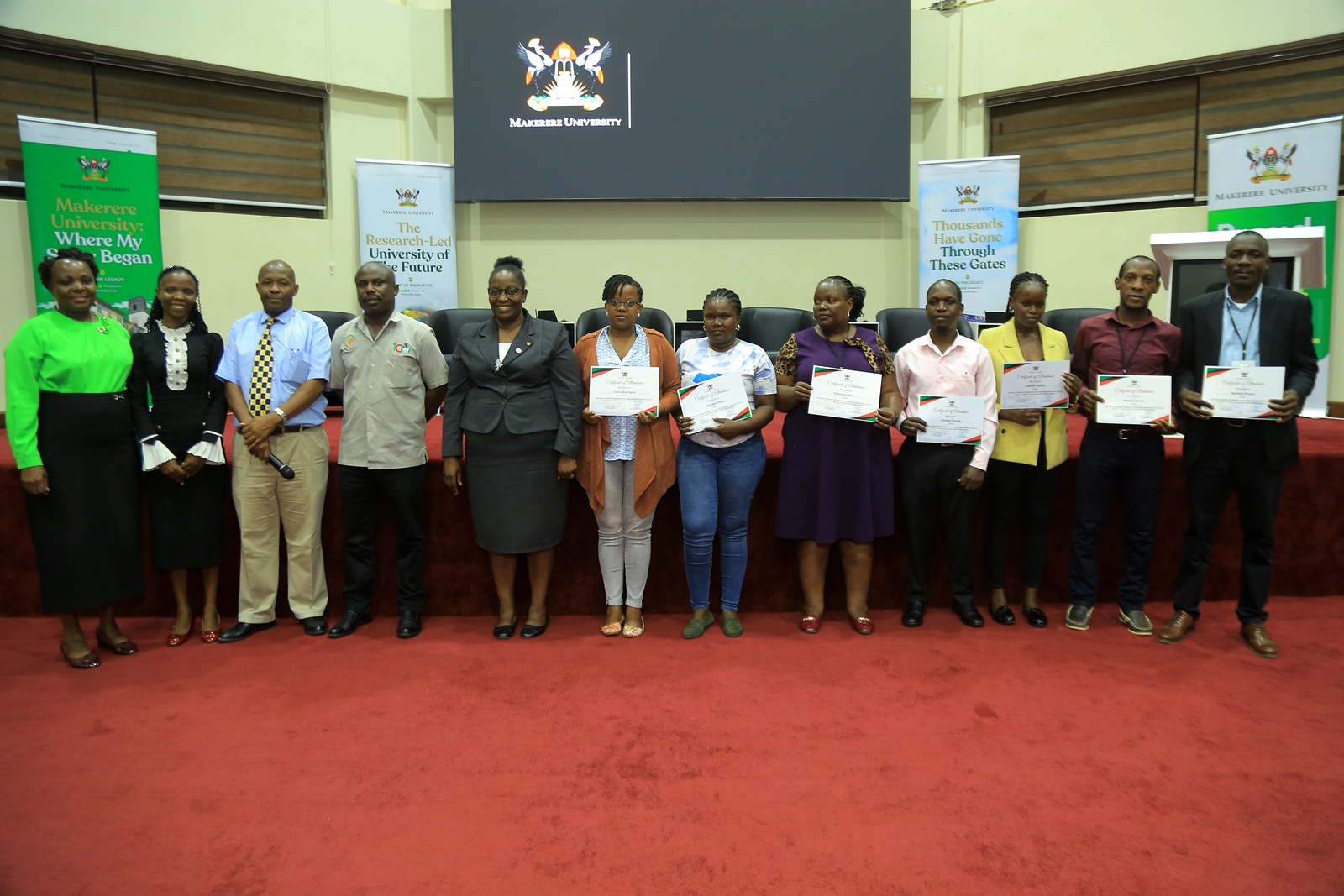
Ms. Ritah Namisango who joined the university service in May 2006 as an Administrative Assistant in the Office of the Vice Chancellor, and has over the years, served in the capacity of Public Relations Officer, Communication Officer, Senior Public Relations Officer, and Principal Public Relations Officer moderated the proceedings of the two-day induction workshop.
You may like
-


Over 9,200 to graduate at Makerere University’s 76th Graduation
-


76th Graduation Highlights
-
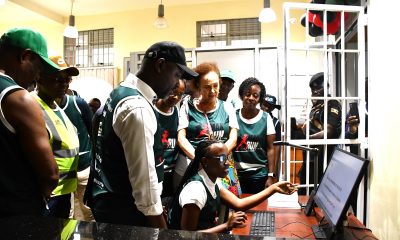

Students empowered to thrive through the Semester
-
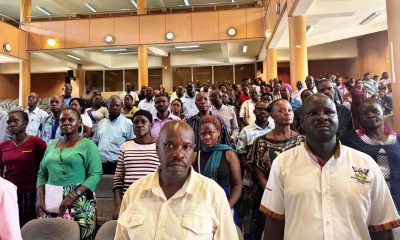

Support Staff Trained to Promote Safety of Students and Stakeholders
-
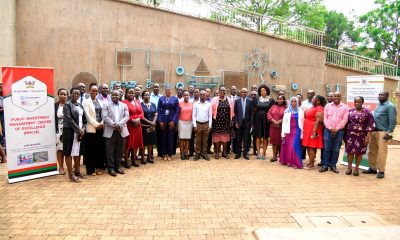

Makerere Hosts Second Cohort of MoKCC&MA Procurement Officers for E&S Safeguards Training
-
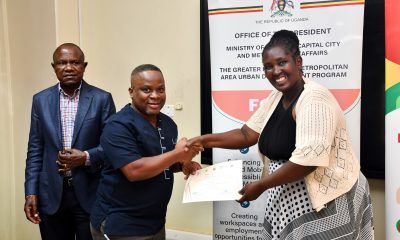

PIM Centre Awards Certificates to MoKCC&MA Officers after Safeguards Training
General
Over 9,200 to graduate at Makerere University’s 76th Graduation
Published
11 hours agoon
February 24, 2026
Pomp and colour defined the opening day of the Makerere University’s 76th Graduation Ceremony as thousands gathered to celebrate academic excellence and new beginnings.
The historic ceremony has brought together scholars, families, friends and industry partners in a vibrant celebration of achievement and possibility. Throughout the four-day event, the University will confer degrees and award diplomas to 9,295 graduands in recognition of their dedication and hard work.
Among the graduates, 213 will receive Doctor of Philosophy (PhD) degrees, 2,503 will graduate with Master’s degrees, and 6,343 will earn Bachelor’s degrees. In addition, 206 students will graduate with postgraduate diplomas, while 30 will be awarded undergraduate diplomas.
Of the total number of graduands, 4,262 are female and 5,033 are male. According to Vice Chancellor, this marks the first time in 15 years that male graduands have outnumbered their female counterparts.
The best overall graduand in the Sciences, Esther Ziribaggwa, graduated on the opening day with the Bachelor of Agricultural and Rural Innovation and an impressive Cumulative Grade Point Average (CGPA) of 4.77.

The ceremony marks a proud moment for Makerere University as it continues to nurture top-tier professionals across diverse fields.
While presiding over the graduation, the State Minister for Primary Education, Hon. Dr. Joyce Moriku Kaducu, on behalf of the First Lady and Minister of Education and Sports, Hon. Janet Kataaha Museveni, pointed out that Makerere University is a model institution, where leaders are nurtured, scholars are sharpened, and where dreams have been given direction.
In her address, Hon. Museveni, highlighted Government’s deliberate investment in research, innovation, and infrastructure to strengthen higher education in Uganda.
“The establishment of the Makerere University Research and Innovation Fund (RIF), supports high-impact research and innovation that directly contributes to national priorities and development. Through this initiative, thousands of researchers and innovators have pursued practical, scalable solutions that are transforming communities and key sectors across Uganda,” Mrs Museveni, said.
The Minister also noted that Parliament’s approved a USD 162 million concessional loan to upgrade science, technology, and innovation infrastructure at Makerere University. The funding will facilitate the construction of modern laboratories, smart classrooms, and state-of-the-art facilities for Engineering and Health Sciences, investments expected to position the University firmly within the Fourth Industrial Revolution.
“Government has embarked on the construction of a National Stadium at Makerere University and other institutions of higher learning across the country. This will promote physical education, strengthen talent identification, and boost investment in the sports sector,”

Turning to the graduands, the Minister encouraged them to see themselves not merely as job seekers, but as job creators and solution-makers.
Uganda and Africa need innovators who will modernize agriculture; engineers who will build quality infrastructure; healthcare professionals who will strengthen health systems; and educators who will inspire the next generation,” the Honourable Minister said.
She reminded graduates that they are entering a rapidly changing world shaped by Artificial Intelligence, climate change, and shifting global markets. To thrive, she advised them to remain adaptable, creative, and committed to lifelong learning.
She also encouraged graduates interested in entrepreneurship to tap into the Government’s Parish Development Model, which provides community-based financing and production support.
Quoting Proverbs 3:5–6, the Minister urged the graduates to trust in God as they embark on their next chapter.
She extended special appreciation to the Mastercard Foundation for its 13-year partnership with Makerere University in expanding access to education and empowering young people in Uganda and beyond.
In his speech, the Chancellor of Makerere University, Dr Crispus Kiyonga, urged graduands to harness research, innovation and technology to drive Uganda’s transformation.

“This is a milestone in your lives. You have invested time, discipline and hard work to attain these qualifications. It is important that you derive value from this achievement, not only for yourselves, but for your families and for society.” Dr Kiyonga, said.
Dr. Kiyonga expressed gratitude to the Government of Uganda for its continued financial support to the University, particularly the funding allocated under MakRIF, which he described as critical in strengthening the institution’s research capacity.
“Research plays a very vital role in the development of any community. Makerere as the oldest University in the country is doing a significant amount of research, However, more work is required to mobilize additional resources to further strengthen research at the University.” Dr Kiyonga, noted.
Acknowledging the challenges of a competitive job market, Dr. Kiyonga encouraged graduates to think beyond traditional employment pathways.
“It is true that the job market may not absorb all of you immediately. But the knowledge you have acquired is empowering. You can create work for yourselves, individually or in teams.” Dr Kiyonga, said.
He advised the graduands to embrace discipline, integrity and adaptability in the workplace, and to take advantage of technology and digital platforms to innovate and respond to societal challenges.
“Every development challenge presents an opportunity. Believe that you can apply your knowledge to create solutions with impact.” He said.
Addressing the congregation, the Vice Chancellor, Prof Barnabas Nawangwe, congratulated the graduands, particularly staff and societal leaders on their respective achievements.

“I congratulate all our graduands upon reaching this milestone. In a special way I congratulate the members of staff, Ministers, and Members of Parliament that are graduating today as well as children and spouses of members of staff,” Prof Nawangwe, said.
In his speech, Prof Nawangwe, recognized outstanding PhD students, particularly members of staff. who completed their PhDs in record time without even taking leave from their duties.
He called upon graduates not to despise humble beginnings but rather reflect on the immense opportunities around them and rise to the occasion as entrepreneurs.
“You are all graduating with disciplines that are needed by society. We have equipped you with the knowledge and skills that will make you employable or create your own businesses and employ others. Do not despair if you cannot find employment. Instead, reflect on the immense opportunities around you and rise to the occasion as an entrepreneur,” Prof Nawangwe, said.
Prof Nawangwe called upon the graduands of PhDs to use their degrees to transform the African continent.
“As you leave the gates of Makerere I urge you to put to good use the knowledge you have received from one of the best universities in the World to improve yourselves, your families, your communities, your Country and humanity. Let people see you and know that you are a Makerere alumnus because of the way you carry yourself in society with dignity and integrity. Put your trust in God and honour your parents and opportunities will be opened for you,” Prof Nawangwe, said.
Delivering a key note address, Prof. Nicholas Ozor, the Executive Director of the African Technology Policy Studies Network Nairobi, Kenya ((ATPS). Reminded the graduates that a degree is not a finish line but the beginning of accountability. “The world is a complex, fast changing and deeply unequal. Degrees make you responsible for others not better than them,” Prof Ozor, said.

The 76th Graduation Ceremony of Makerere University will be held from Tuesday 24th to Friday 27th February, 2026. A total of 213 PhDs (87 female, 126 male), 2,503 Masters (1,087 female, 1,416 male), 206 Postgraduate Diplomas (80 female, 126 male), 6,343 Undergraduate Degrees (2,999 female, 3,344 male), and 30 Undergraduate Diplomas (9 female, 21 male) will be graduating from all the Colleges.
Ms. Sarah Aloyo and Ms. Nakato Dorothy both students of the Bachelor of Procurement and Supply Chain Management emerged as the best in the Humanities and Best Overall students with a CGPA of 4.93. Mr. Ssewalu Abdul, a Bachelor of Leisure and Hospitality Management student emerged second best in the Humanities with a CGPA 4.90. Ms. Esther Ziribaggwa emerged as the best student in the Sciences with a CGPA of 4.77 in the Bachelor of Agricultural and Rural Innovation, while Mr. Simon Mungudit emerged second best in the Sciences with a CGPA of 4.76 in the Bachelor of Science in Petroleum Geoscience and Production.
Commencement Speakers
- Day 1 – Prof. Nicholas Ozor, the Executive Director of the African Technology Policy Studies Network, Nairobi, Kenya
- Day 2 – Prof. Dr. Maggie Kigozi, Chairperson Makerere University Endowment Fund Board
- Day 3 – Dr. Patricia Adongo Ojangole, Managing Director, Uganda Development Bank Limited
- Day 4 – Ms. Reeta Roy, Former President & Chief Executive Officer, Mastercard Foundation
The 76th Graduation Ceremony will be held at the Freedom Square following the schedule below:
Tuesday, 24th February, 2026
College of Agricultural and Environmental Sciences (CAES)
College of Computing and Information Sciences (CoCIS)
College of Education and External Studies (CEES)
School of Law (SoL)
Livestream Link for Day 1: https://youtube.com/live/wVGPA0FJ9pU
Wednesday, 25th February, 2026
College of Health Sciences (CHS)
College of Natural Sciences (CoNAS)
College of Veterinary Medicine, Animal Resources and Bio-security (CoVAB)
School of Public Health (SPH)
Thursday, 26th February, 2026
Makerere University Business School (MUBS)
College of Business and Management Sciences (CoBAMS)
Friday, 27th February, 2026
College of Engineering, Design, Art and Technology (CEDAT)
College of Humanities and Social Sciences (CHUSS)
Institute of Gender and Development Studies (IGDS)
Makerere Institute of Social Research (MISR)
General
Mak Selected to Host Alliance for African Partnership Africa Office
Published
2 days agoon
February 23, 2026
Makerere University has been selected to host the Africa Office of the Alliance for African Partnership (AAP). The significant milestone that underscores Makerere’s role in fostering research, innovation, and global collaborations across the continent was announced at a meeting of the University’s Central Management with an AAP delegation on 23rd February 2026.
Makerere’s selection was based on the University’s robust commitment, alignment with the AAP’s Strategic Plan, and proven ability to manage consortium activities. The AAP, which was initiated by Michigan State University (MSU) in collaboration with Ten African Universities and agricultural policy research networks in 2016, targets critical challenges in education, youth empowerment, health and nutrition, agri-food systems, science and technology, water, energy, environment, and culture and society.
Addressing the delegation consisting of AAP Co-Directors from MSU, Dr. Jose Jackson-Malete and Dr. Amy Jamison, accompanied by newly-appointed Director of the AAP Africa Office, Dr. Racheal Ddungu Mugabi and Ms. Clare Cheromoi, the Vice Chancellor, Prof. Barnabas Nawangwe who appreciated the choice of Makerere to host the Africa Office said:
“One of the greatest challenges facing African universities is PhD training, particularly supervisory capacity. Through partnerships such as the Alliance for African Partnership we can leverage international expertise to strengthen supervision—whether through training supervisors or through joint supervision arrangements.”
Prof. Nawangwe equally applauded joint initiatives such as the Grant Writing and Publication project, which gave rise to the establishment of a Writing Centre that he said can be used to build capacity in AAP member universities with Makerere as the hub. Officially launched on 21st March 2023, the project is living up to its expectation of becoming a springboard for strong postdoctoral collaborative research for both institutions and other US universities.
Dr. Titus Awokuse, Vice Provost and Dean for International Studies and Programs at Michigan State University (MSU) who attended virtually, reiterated that Makerere’s selection reflects its long-standing commitment to advancing African higher education, research excellence, and meaningful global collaboration.
Reflecting on the origins of the Alliance for African Partnerships (AAP), Dr. Awokuse explained that nearly a decade ago, MSU initiated a transformative conversation in Atlanta centered on the question: How should we partner differently? From this dialogue emerged AAP—an Africa-centered consortium that now brings together 12 institutions across Africa and the United States.

He emphasized that AAP is grounded in equity, mutual benefit, shared leadership, and deep respect for African priorities and expertise. Since its founding, MSU has served as convener and key supporter, working with member institutions to strengthen research collaboration, promote faculty and student engagement, and address shared development priorities.
Dr. Awokuse underscored that AAP’s success is the result of collective vision and commitment, not the efforts of a single institution. He paid tribute to Lilongwe University of Agriculture and Natural Resources for hosting the Africa Office in its early years and acknowledged the foundational leadership of the inaugural Africa Office Director.
He described the launch of the Africa Office at Makerere University as a significant milestone that reinforces Africa-led leadership, strengthens regional collaboration, and enhances responsiveness to emerging opportunities. MSU, he affirmed, remains fully committed to AAP and to working closely with Makerere and all consortium partners to expand collaborative research, nurture the next generation of scholars, and advance Africa-led solutions to global challenges.
The newly-appointed AAP Africa Office Director, Dr. Racheal Ddungu Mugabi is a member of faculty in the Department of Development Studies, Institute of Gender and Development Studies. Her work on intersectional inequalities in Uganda and other Global South regions uniquely positions her to drive collaborative research and partnerships at the Africa Office.
Initially founded by ten African Universities and MSU, AAP now comprises eleven African members including; the African Network of Agricultural Policy Institutes (ANAPRI)-Zambia, Egerton University-Kenya, Lilongwe University of Agriculture and Natural Resources (LUANAR)-Malawi, Makerere University-Uganda, United States International University-Africa-Kenya, Universite Cheikh Anta Diop-Senegal, Universite Yambo Ouologuem de Bamako-Mali, University of Botswana-Botswana, University of Dar es Salaam-Tanzania, University of Nigeria, Nsukka-Nigeria, and the latest, University of Pretoria-South Africa.
These Universites collaborate under Focal Points to advance policy-relevant research and sustainable development. Makerere University’s Focal Point is Prof. Robert Wamala, Director of Research, Innovations and Partnerships (DRIP).
Addressing the University Management, Dr. Jackson-Malete outlined the African Futures Research Leadership Program, which nurtures early career scholars through mentorship and skill-building as one of AAP’s flagship programs. She noted that the Program that prioritizes female participants or men committed to promoting women in higher education has for the first time during its fifth cohort admitted the first male, Dr. Alfadaniels Mabingo from the Department of Performing Arts and Film, Makerere University.
The AAP Africa Office at Makerere will coordinate activities, boost research collaboration, mobilize resources, and enhance global engagements for socio-economic transformation. This aligns with Makerere‘s broader goals of leveraging international expertise to build resilient institutions.
View more photos from the event: https://flic.kr/s/aHBqjCLjoA
Trending
-

 Humanities & Social Sciences2 days ago
Humanities & Social Sciences2 days agoMeet Najjuka Whitney, The Girl Who Missed Law and Found Her Voice
-

 Health6 days ago
Health6 days agoUganda has until 2030 to end Open Defecation as Ntaro’s PhD Examines Kabale’s Progress
-

 Agriculture & Environment5 days ago
Agriculture & Environment5 days agoUganda Martyrs Namugongo Students Turn Organic Waste into Soap in an Innovative School Project on Sustainable Waste Management
-

 General7 days ago
General7 days agoMastercard Foundation Scholars embrace and honour their rich cultural diversity
-

 Health2 weeks ago
Health2 weeks agoCall for Applications: Short Course in Molecular Diagnostics March 2026
